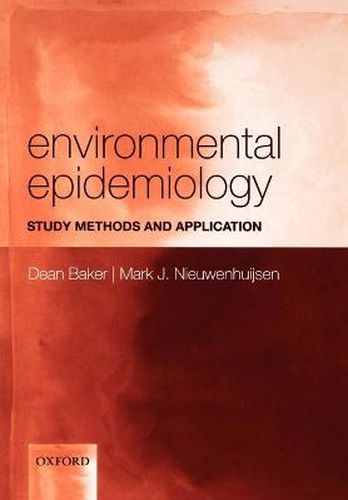Readings Newsletter
Become a Readings Member to make your shopping experience even easier.
Sign in or sign up for free!
You’re not far away from qualifying for FREE standard shipping within Australia
You’ve qualified for FREE standard shipping within Australia
The cart is loading…






Air pollution, water contamination, persistent organic pollutants, pesticides, metals, and radiofrequencies are just some examples of environmental factors that have been linked to adverse health effects such as cancer, respiratory disease and reproductive problems. Environmental epidemiology studies the interaction of disease and these environmental determinants of disease at a population level. Whilst risks associated with environmental exposures are generally small, the exposed population, and hence the population burden of disease, may be large. To detect these small risks, it is therefore essential that related methods and their application are refined. In addition, there is increasing attention on environmental health issues from the public, government, and media, thus raising the profile of envrionmental epidemiology in preventive medicine. This book describes the methods of environmental epidemiology, with emphasis on good practice. It outlines the basic principles of epidemiology and environmental health, and describes in more detail special environmental epidemiological designs that are rarely described in other textbooks.The principles of health risk assessment and forecasting, as well as the application of study data in these types of study, are explored. Several chapters cover practical issues in the conduct of studies, such as field work and data analyses and its requirements. Ethical issues and the role of environmental epidemiology in policy making are also covered.
$9.00 standard shipping within Australia
FREE standard shipping within Australia for orders over $100.00
Express & International shipping calculated at checkout
Air pollution, water contamination, persistent organic pollutants, pesticides, metals, and radiofrequencies are just some examples of environmental factors that have been linked to adverse health effects such as cancer, respiratory disease and reproductive problems. Environmental epidemiology studies the interaction of disease and these environmental determinants of disease at a population level. Whilst risks associated with environmental exposures are generally small, the exposed population, and hence the population burden of disease, may be large. To detect these small risks, it is therefore essential that related methods and their application are refined. In addition, there is increasing attention on environmental health issues from the public, government, and media, thus raising the profile of envrionmental epidemiology in preventive medicine. This book describes the methods of environmental epidemiology, with emphasis on good practice. It outlines the basic principles of epidemiology and environmental health, and describes in more detail special environmental epidemiological designs that are rarely described in other textbooks.The principles of health risk assessment and forecasting, as well as the application of study data in these types of study, are explored. Several chapters cover practical issues in the conduct of studies, such as field work and data analyses and its requirements. Ethical issues and the role of environmental epidemiology in policy making are also covered.